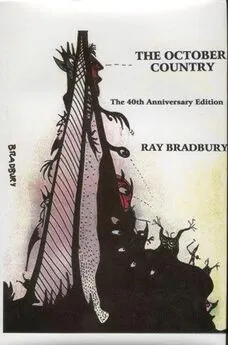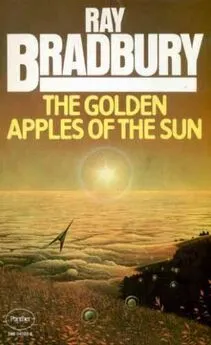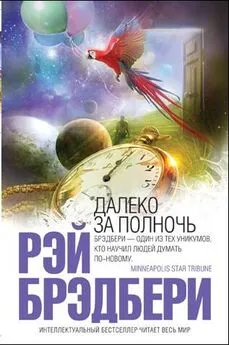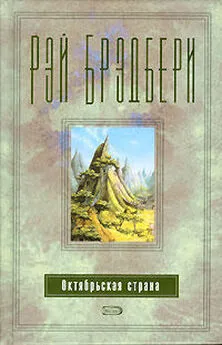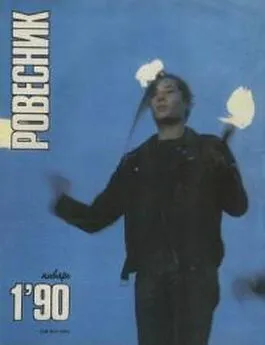Рэй Бредбери - Октябрьская страна (The October Country), 1955
- Название:Октябрьская страна (The October Country), 1955
- Автор:
- Жанр:
- Издательство:неизвестно
- Год:неизвестен
- ISBN:нет данных
- Рейтинг:
- Избранное:Добавить в избранное
-
Отзывы:
-
Ваша оценка:
Рэй Бредбери - Октябрьская страна (The October Country), 1955 краткое содержание
И вновь сборник «ужастиков» раннего Брэдбери, разбавленных поздними житейско-психологическими историями («Прикосновение пламени»). Из ранних своих запасов писатель извлёк на свет настоящие жемчужины: такие как «Озеро» и «Коса».
Октябрьская страна (The October Country), 1955 - читать онлайн бесплатно полную версию (весь текст целиком)
Интервал:
Закладка:
The mechanic arose from the car engine, scowled at Joseph and they spoke together in Spanish, quietly.
She rolled the window down and listened.
"What's he say?" she demanded.
The two men talked on.
"What does he say?" she asked.
The dark mechanic waved at the engine. Joseph nodded and they conversed.
"What's wrong?" Marie wanted to know.
Joseph frowned over at her. "Wait a moment, will you? I can't listen to both of you."
The mechanic took Joseph's elbow. They said many words.
"What's he saying now?" she asked.
"He says-" said Joseph, and was lost as the Mexican took him over to the engine and bent him down in earnest discovery.
"How much will it cost?" she cried, out the window, around at their bent backs.
The mechanic spoke to Joseph.
"Fifty pesos," said Joseph.
"How long will it take?" cried his wife.
Joseph asked the mechanic. The man shrugged and they argued for five minutes.
"How long will it take?" said Marie.
The discussion continued.
The sun went down the sky. She looked at the sun upon the trees that stood high by the cemetery yard. The shadows rose and rose until the valley was enclosed and only the sky was clear and untouched and blue.
"Two days, maybe three," said Joseph, turning to Marie.
"Two days! Can't he fix it so we can just go on to the next town and have the rest done there?"
Joseph asked the man. The man replied.
Joseph said to his wife. "No, he'll have to do the entire job."
"Why, that's silly, it's so silly, he doesn't either, he doesn't really have to do it all, you tell him that, Joe, tell him that, he can hurry and fix it--"
The two men ignored her. They were talking earnestly again.
This time it was all in very slow motion. The unpacking of the suitcases. He did his own, she left hers by the door.
"I don't need anything," she said, leaving it locked.
"You'll need your nightgown," he said.
"I'll sleep naked," she said.
"Well, it isn't my fault," he said. "That damned car."
"You can go down and watch them work on it, later," she said. She sat on the edge of the bed. They were in a new room. She had refused to return to their old room. She said she couldn't stand it. She wanted a new room so it would seem they were in a new hotel in a new city. So this was a new room, with a view of the alley and the sewer system instead of the plaza and the drum-box trees. "You go down and supervise the work, Joe. If you don't, you know they'll take weeks!" She looked at him. "You should be down there now, instead of standing around."
"I'll go down," he said.
"I'll go down with you. I want to buy some magazines."
"You won't find any American magazines in a town like this."
"I can look, can't I?"
"Besides, we haven't much money," he said. "I don't want to have to wire my bank. It takes a god-awful time and it's not worth the bother."
"I can at least have my magazines," she said.
"Maybe one or two," he said.
"As many as I want," she said, feverishly, on the bed.
"For God's sake, you've got a million magazines in the car now. Posts, Collier's, Mercury, Atlantic Monthly s, Barnaby. Superman! You haven't read half of the articles."
"But they're not new," she said. "They're not new, I've looked at them and after you've looked at a thing, I don't know--"
"Try reading them instead of looking at them," he said.
As they came downstairs night was in the plaza.
"Give me a few pesos," she said, and he gave her some. "Teach me to say about magazines in Spanish," she said.
"Quiero una publicacion Americana," he said, walking swiftly.
She repeated it, stumblingly, and laughed. "Thanks."
He went on ahead to the mechanic's shop, and she turned in at the nearest Farmacia Botica, and all the magazines racked before her there were alien colors and alien names. She read the titles with swift moves of her eyes and looked at the old man behind the counter. "Do you have American magazines?" she asked in English, embarrassed to use the Spanish words.
The old man stared at her.
"Habla Ingles?" she asked.
"No, senorita."
She tried to think of the right words. "Quiero-no!" She stopped. She started again. "Americano-uh-maggah-zeen-as?"
"Oh, no, senorita!"
Her hands opened wide at her waist, then closed, like mouths. Her mouth opened and closed. The shop had a veil over it, in her eyes. Here she was and here were these small baked adobe people to whom she could say nothing and from whom she could get no words she understood, and she was in a town of people who said no words to her and she said no words to them except in blushing confusion and bewilderment. And the town was circled by desert and time, and home was far away, far away in another life.
She whirled and fled.
Shop following shop she found no magazines save those giving bullfights in blood on their covers or murdered people or lace-confection priests. But at last three poor copies of the Post were bought with much display and loud laughter and she gave the vendor of this small shop a handsome tip.
Rushing out with the Posts eagerly on her bosom in both hands she hurried along the narrow walk, took a skip over the gutter, ran across the street, sang la-la, jumped onto the further walk, made another little scamper with her feet, smiled an inside smile, moving along swiftly, pressing the magazines tightly to her, half-closing her eyes, breathing the charcoal evening air, feeling the wind watering past her ears.
Starlight tinkled in golden nuclei off the highly perched Greek figures atop the State theatre. A man shambled by in the shadow, balancing upon his head a basket. The basket contained bread loaves.
She saw the man and the balanced basket and suddenly she did not move and there was no inside smile, nor did her hands clasp tight the magazines. She watched the man walk, with one band of his gently poised up to tap the basket any time it unbalanced, and down the street he dwindled, while the magazines slipped from Marie's fingers and scattered on the walk.
Snatching them up, she ran into the hotel and almost fell going upstairs.
She sat in the room. The magazines were piled on each side of her and in a circle at her feet. She had made a little castle with portcullises of words and into this she was withdrawn. All about her were the magazines she had bought and bought and looked at and looked at on other days, and these were the outer barrier, and upon the inside of the barrier, upon her lap, as yet unopened, but her hands were trembling to open them and read and read and read again with hungry eyes, were the three battered Post magazines. She opened the first page. She would go through them page by page, line by line, she decided. Not a line would go unnoticed, a comma unread, every little ad and every color would be fixed by her. And-she smiled with discovery- in those other magazines at her feet were still advertisements and cartoons she had neglected-there would be little morsels of stuff for her to reclaim and utilize later.
She would read this first Post tonight, yes tonight she would read this first delicious Post. Page on page she would eat it and tomorrow night, if there was going to be a tomorrow night, but maybe there wouldn't be a tomorrow night here, maybe the motor would start and there'd be odors of exhaust and round hum of rubber tire on road and wind riding in the window and pennanting her hair-but, sup-pose, just suppose there would BE a tomorrow night here, in this room. Well, then, there would be two more Posts, one for tomorrow night, and the next for the next night. How neatly she said it to herself with her mind's tongue. She turned the first page.
She turned the second page. Her eyes moved over it and over it and her fingers unknown to her slipped under the next page and flickered it in preparation for turning, and the watch ticked on her wrist, and time passed and she sat turning pages, turning pages, hungrily seeing the framed people in the pictures, people who lived in another land in another world where neons bravely held off the night with crimson bars and the smells were home smells and the people talked good fine words and here she was turning the pages, and all the lines went across and down and the pages flew under her hands, making a fan. She threw down the first Post, seized on and rimed through the second in half an hour, threw that down, took up the third, threw that down a good fifteen minutes later and found herself breathing, breathing stiffly and swiftly in her body and out of her mouth. She put her hand up to the back of her neck.
Somewhere, a soft breeze was blowing.
The hairs along the back of her neck slowly stood up-right.
She touched them with one pale hand as one touches the nape of a dandelion.
Outside, in the plaza, the street lights rocked like crazy flashlights on a wind. Papers ran through the gutters in sheep flocks. Shadows penciled and slashed under the bucketing lamps now this way, now that, here a shadow one instant, there a shadow next, now no shadows, all cold light, now no light, all cold blue-black shadow. The lamps creaked on their high metal hasps.
In the room her hands began to tremble. She saw them tremble. Her body began to tremble. Under the bright bright print of the brightest, loudest skirt she could find to put on especially for tonight, in which she had whirled and cavorted feverishly before the coffin-sized mirror, beneath the rayon skirt the body was all wire and tendon and excitation. Her teeth chattered and fused and chattered. Her lipstick smeared, one lip crushing another.
Joseph knocked on the door.
They got ready for bed. He had returned with the news that something had been done to the car and it would take time, he'd go watch them tomorrow.
"But don't knock on the door," she said, standing before the mirror as she undressed.
"Leave it unlocked then," he said.
"I want it locked. But don't rap. Call."
"What's wrong with rapping?" he said.
"It sounds funny," she said.
"What do you mean, funny?"
She wouldn't say. She was looking at herself in the mirror and she was naked, with her hands at her sides, and there were her breasts and her hips and her entire body, and it moved, it felt the floor under it and the walls and air around it, and the breasts could know hands if hands were put there, and the stomach would make no hollow echo if touched.
"For God's sake," he said, "don't stand there admiring yourself." He was in bed. "What are you doing?" he said. "What're you putting your hands up that way for, over your face?"
He put the lights out.
She could not speak to him for she knew no words that he knew and he said nothing to her that she understood, and she walked to her bed and slipped into it and he lay with his back to her in his bed and he was like one of these brown-baked people of this far-away town upon the moon, and the real earth was off somewhere where it would take a star-flight to reach it. If only he could speak with her and she to him tonight, how good the night might be, and how easy to breathe and how lax the vessels of blood in her ankles and in her wrists and the under-arms, but there was no speaking and the night was ten thousand tickings and ten thousand twistings of the blankets, and the pillow was like a tiny white warm stove under-cheek, and the blackness of the room was a mosquito netting draped all about so that a turn entangled her in it. If only there was one word, one word between them. But there was no word and the veins did not rest easy in the wrists and the heart was a bellows forever blowing upon a little coal of fear, forever illumining and making it into a cherry light, again, pulse, and again, an ingrown light which her inner eyes stared upon with unwanting fascination. The lungs did not rest but were exercised as if she were a drowned person and she herself performing artificial respiration to keep the last life going. And all of these things were lubricated by the sweat of her glowing body, and she was glued fast between the heavy blankets like something pressed, smashed, redolently moist between the white pages of a heavy book.
Читать дальшеИнтервал:
Закладка:
